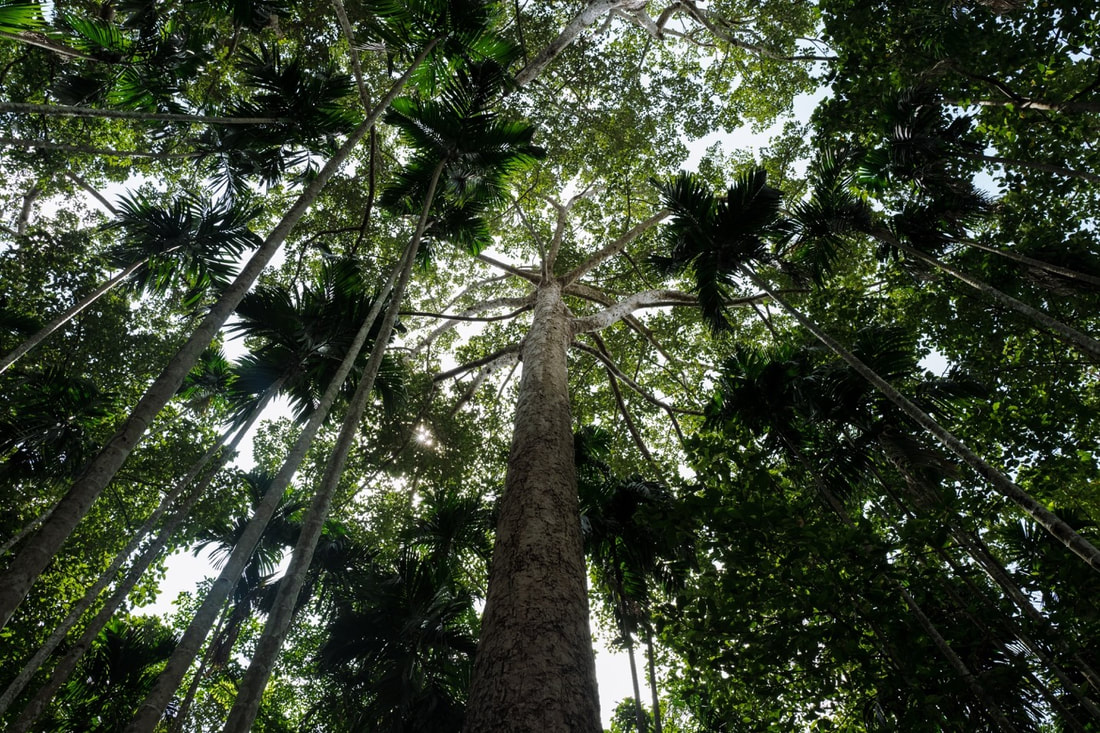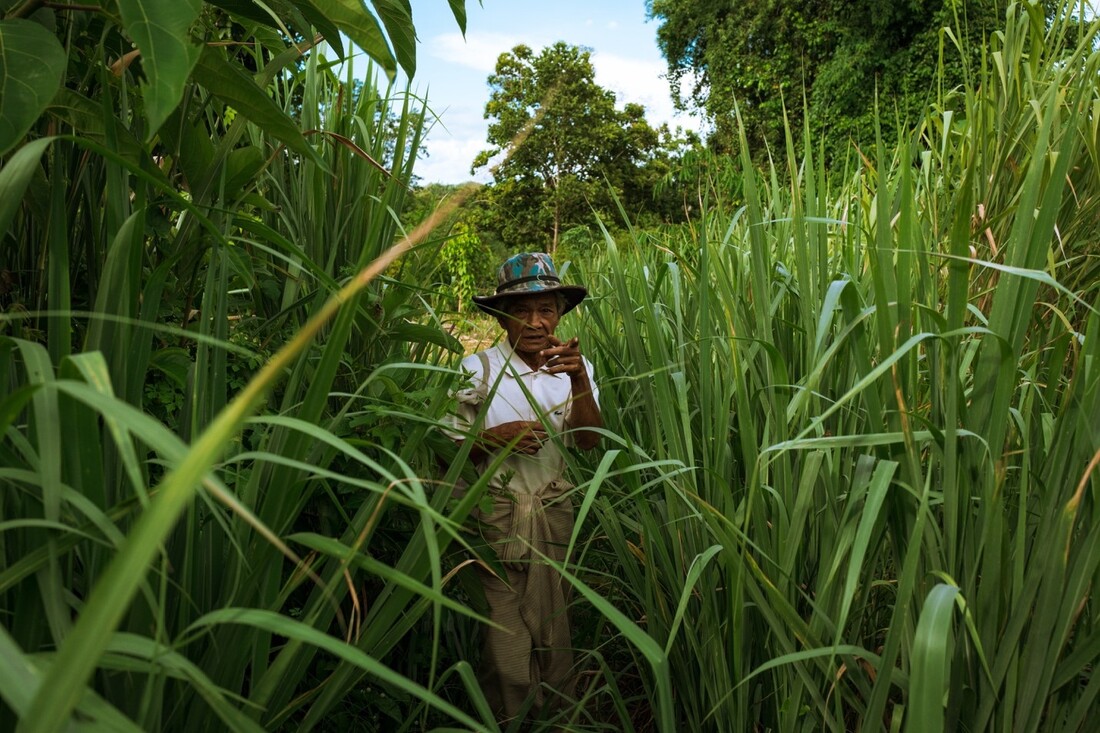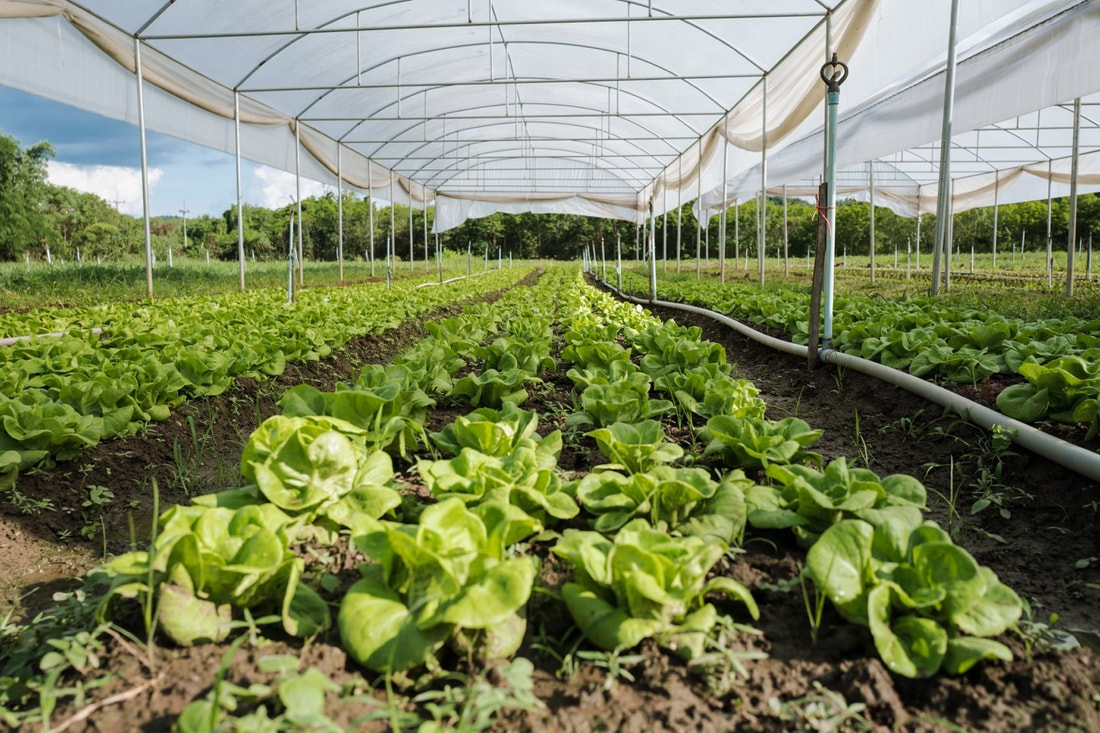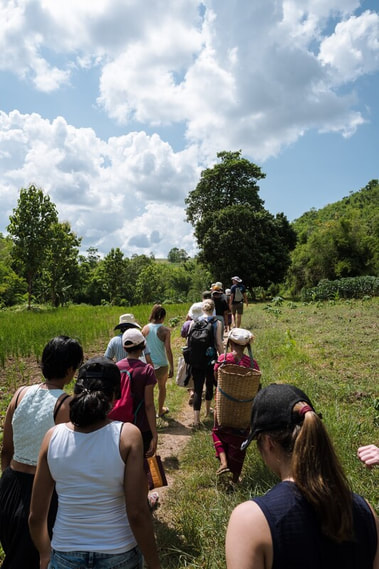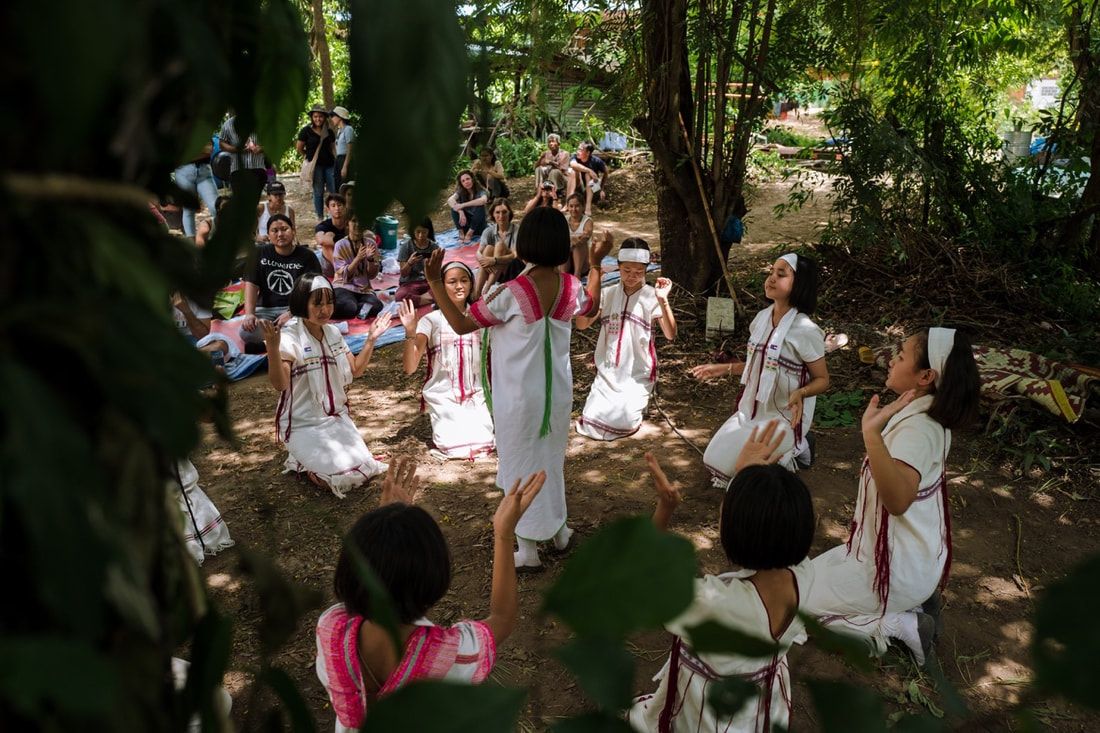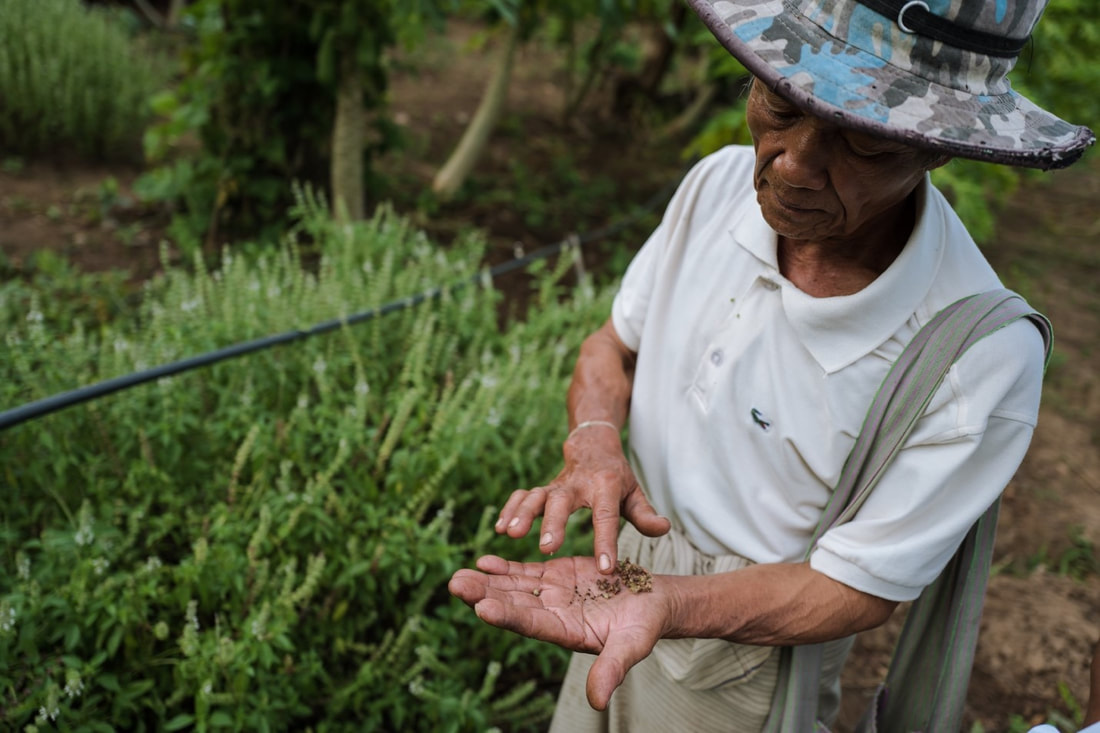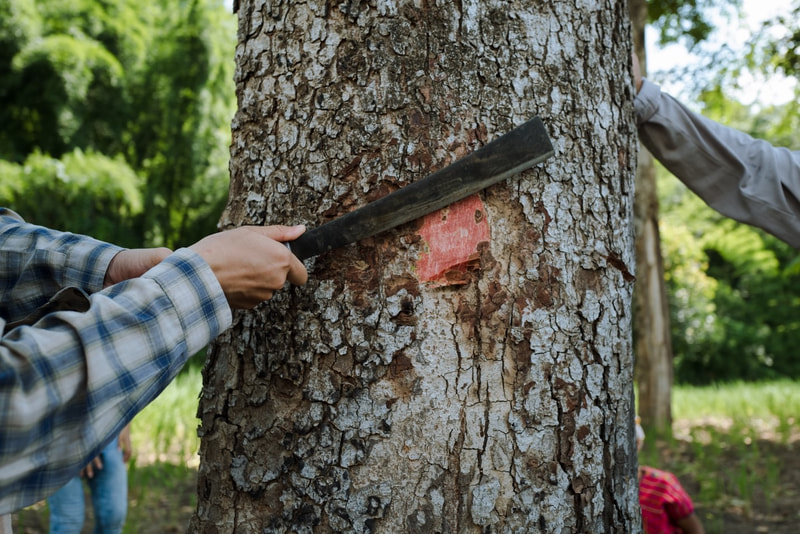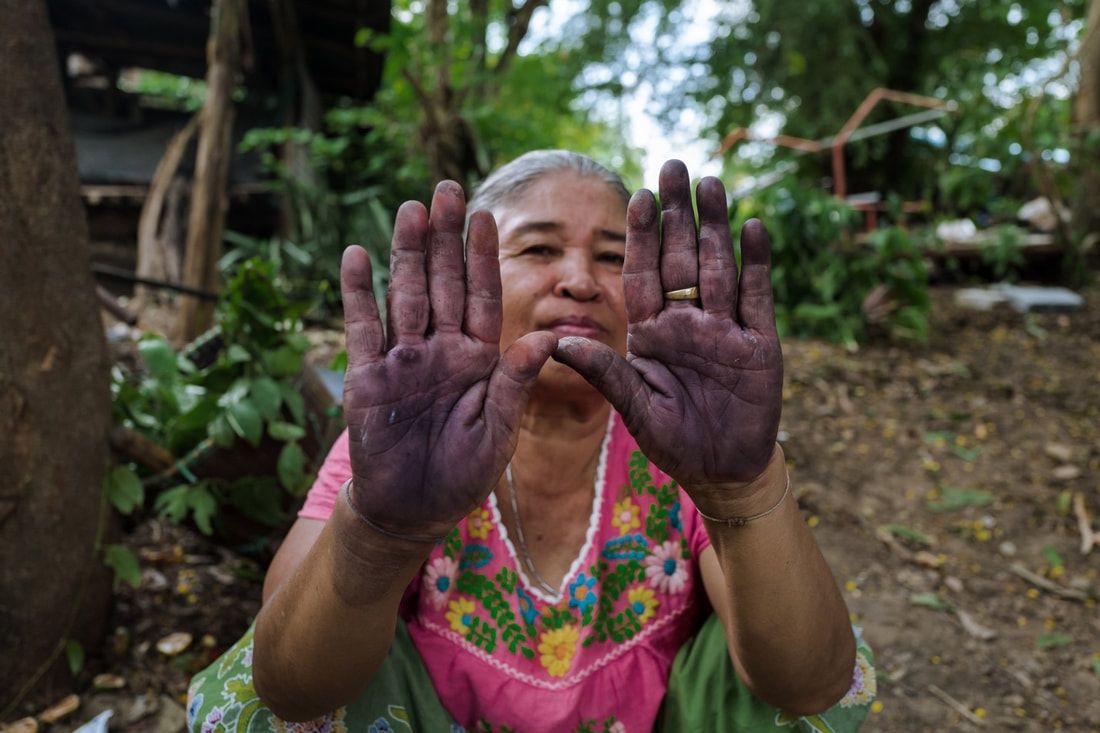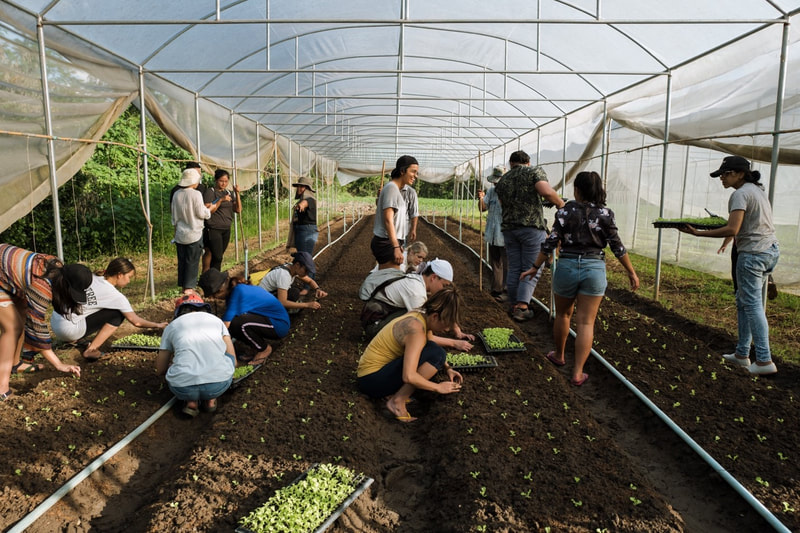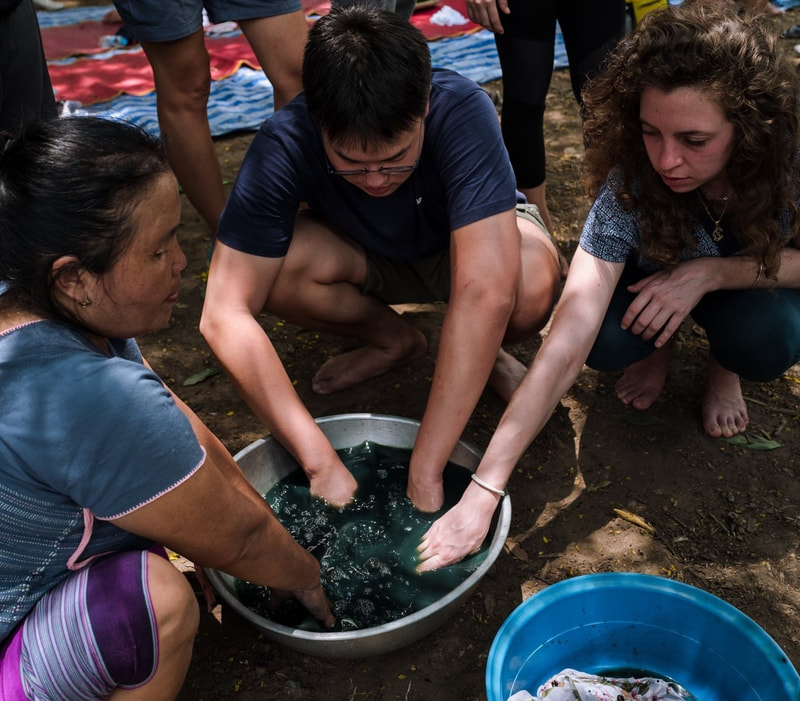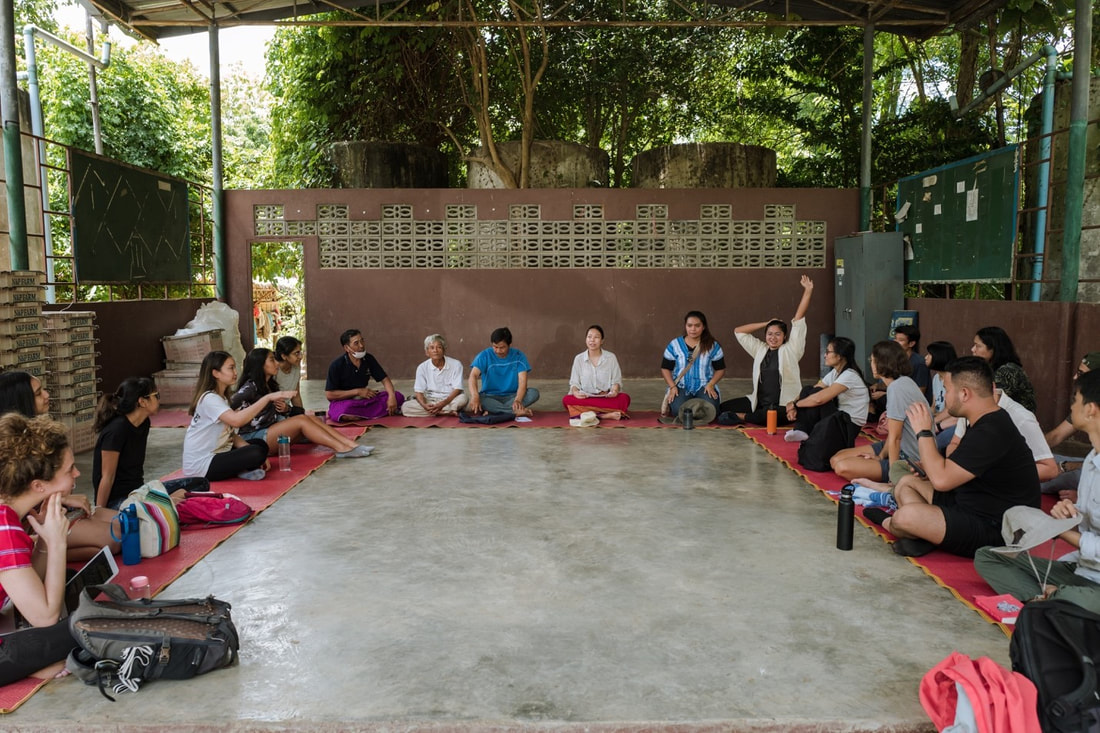Don’t miss these other features in this Nature & Cultures Fall 2020 issue: "Understanding the situation in Belarus", and our permanent features: The Comparative Government Project, our book review section, and our elctronic library, the N&C portal (a rich portal on nature and human geography).
Disconnecting from Bangkok to reconnect with Nature: the Adventure of Happy Grocers, an Organic and Youth-led Food Startup.
story © by Sofia Cavalleri and Moh Suthasiny. All photos on this page (including header) © by Samuel Castan.
Happy Grocers is a youth-led food start-up based in Bangkok and focusing on redesigning and incentivizing sustainable city-regional food systems, connecting producers and consumers more directly. Our vision is that by giving more visibility to farmers’ knowledge and perspectives we can ensure a stronger connection and trust between producers and consumers and build sustainable food systems. Happy Grocers claims to "envision a circular economic model that is based on trust, sustainability, compassion and conscious consumption."
Texts, photographs, links and any other content appearing on Nature & Cultures should not be construed as endorsement by The American University of Paris of organizations, entities, views or any other feature. Individuals are solely responsible for the content they view or post.
“Nature is our teacher”
With this slogan, uncle Kwai welcomes the Happy Grocers community to the Huai Hin Dam village in Suphan Buri, on a very warm and sunny Saturday morning. Uncle Kwai is the leader of this Thai-Karen community. Right next to him is uncle Noey, who has been protesting against deforestation and land concession for years, nodding while looking at the Happy Grocers explorers with an empathic smile.
But let’s take a step back.
Happy Grocers was created on the 27th of March 2020, founded by Moh and Pearl against many odds right in the middle of the Covid-19 pandemic crisis which has disrupted complex food systems in Bangkok. After implementing their vision, creating the start-up from zero the founders of Happy Grocers quickly gained national recognition by winning the 2020 National Startup League. of Thailand.
The founders and partners at Happy Grocers believe that the process of selling and buying food is not a one-time transaction. Our success is based not only on providing good quality organic food, but also on sharing the stories, beliefs, traditions, values behind the food itself. For centuries, food has brought people together as it has the power to build more inclusive and resilient communities!
The mission of Happy Grocers is to create such a community in Bangkok and, potentially, a bigger movement pushing towards sustainable food systems. This is why with our first Happy Trip we connected our consumers and producers through a holistic experience, challenging the urban/rural divide. Our idea? Get the busy Bangkokian urban dwellers to escape from the city routine and “reconnect” with nature. Leave your laptop at home and come with us: touch the soil, smell the forest, eat good local food, sleep in a tent, learn how to make compost from scratch. A 2-day adventure to go deeper and discover not only the source of our food, but also the stories and the people behind it.
With this slogan, uncle Kwai welcomes the Happy Grocers community to the Huai Hin Dam village in Suphan Buri, on a very warm and sunny Saturday morning. Uncle Kwai is the leader of this Thai-Karen community. Right next to him is uncle Noey, who has been protesting against deforestation and land concession for years, nodding while looking at the Happy Grocers explorers with an empathic smile.
But let’s take a step back.
Happy Grocers was created on the 27th of March 2020, founded by Moh and Pearl against many odds right in the middle of the Covid-19 pandemic crisis which has disrupted complex food systems in Bangkok. After implementing their vision, creating the start-up from zero the founders of Happy Grocers quickly gained national recognition by winning the 2020 National Startup League. of Thailand.
The founders and partners at Happy Grocers believe that the process of selling and buying food is not a one-time transaction. Our success is based not only on providing good quality organic food, but also on sharing the stories, beliefs, traditions, values behind the food itself. For centuries, food has brought people together as it has the power to build more inclusive and resilient communities!
The mission of Happy Grocers is to create such a community in Bangkok and, potentially, a bigger movement pushing towards sustainable food systems. This is why with our first Happy Trip we connected our consumers and producers through a holistic experience, challenging the urban/rural divide. Our idea? Get the busy Bangkokian urban dwellers to escape from the city routine and “reconnect” with nature. Leave your laptop at home and come with us: touch the soil, smell the forest, eat good local food, sleep in a tent, learn how to make compost from scratch. A 2-day adventure to go deeper and discover not only the source of our food, but also the stories and the people behind it.
.But let’s take a step back.
Happy Grocers is now 5 months old as I am writing this (august 2020).as it was bravely founded by Moh and Pearl (aka Suthasinee Sudprasert, and Pattamaporn Dumnui), students in the School of Global Studies, Thammasat University, on the 27th of March 2020, right in the middle of the Covid-19 pandemic crisis which has disrupted complex food systems in Bangkok.
Happy Grocers offers its service in Bangkok's Sukhumvit Street, Sathorn District, and Aree neighborhood, selling fresh produce, meat, eggs, and bakery from the local farms . Its truck collects produce from relatively nearby Nakhonpathom, Suphanburi, and as far as Phayao, in the North of Thailand. The website of the Thammasat University mentions something very important: "Happy Grocers also educate the farmers convincing them to grow organic crops, which is not an easy task. To grow organically, the farmers need to register and pay for the certificate, and the farmers are also worried that the demand for this type of product is not high enough. That’s where the Happy Grocers comes in, working on a marketing plan, expanding the customer base, and help the farmers on the farm as well. They also create a new stream of income for the farmer by using a farm as a tourist destination to create a sustainable way of living for the people".
The founders Moh and Pearl are students in the School of Global Studies, Thammasat University. The team of HG is diverse but very young (under-25 years old). Sofia is their certified yoga teacher and knowledge manager (she is completing a PhD on sustainable city-regional food systems in Bangkok and synthesizing the knowledge from the community), Dew is the education manager, Gino is the facilitator, Sam is the Photographer, and Koh who is the social media manager. After Moh and Pearl implemented their vision by creating the start-up from zero Happy Grocers quickly gained national recognition by winning the first place and 50,000 -baht cash prize and trophy at the Startup Thailand League 2020.
Happy Grocers is not your typical food truck as it may seem when superficially observing the startup’s fruit and vegetable delivery activities in Bangok. The company provides the source information of the fruits and vegetables they sell so that customers can know where they are from, how they come from, the method in which they are planted to to avoid future health problems, and how unnecessary plastic waste is reduced by using paper bags or reusable containers. The grocery store also persuaded a small group of small farmers to deliver goods to the store.
Happy Grocers is now 5 months old as I am writing this (august 2020).as it was bravely founded by Moh and Pearl (aka Suthasinee Sudprasert, and Pattamaporn Dumnui), students in the School of Global Studies, Thammasat University, on the 27th of March 2020, right in the middle of the Covid-19 pandemic crisis which has disrupted complex food systems in Bangkok.
Happy Grocers offers its service in Bangkok's Sukhumvit Street, Sathorn District, and Aree neighborhood, selling fresh produce, meat, eggs, and bakery from the local farms . Its truck collects produce from relatively nearby Nakhonpathom, Suphanburi, and as far as Phayao, in the North of Thailand. The website of the Thammasat University mentions something very important: "Happy Grocers also educate the farmers convincing them to grow organic crops, which is not an easy task. To grow organically, the farmers need to register and pay for the certificate, and the farmers are also worried that the demand for this type of product is not high enough. That’s where the Happy Grocers comes in, working on a marketing plan, expanding the customer base, and help the farmers on the farm as well. They also create a new stream of income for the farmer by using a farm as a tourist destination to create a sustainable way of living for the people".
The founders Moh and Pearl are students in the School of Global Studies, Thammasat University. The team of HG is diverse but very young (under-25 years old). Sofia is their certified yoga teacher and knowledge manager (she is completing a PhD on sustainable city-regional food systems in Bangkok and synthesizing the knowledge from the community), Dew is the education manager, Gino is the facilitator, Sam is the Photographer, and Koh who is the social media manager. After Moh and Pearl implemented their vision by creating the start-up from zero Happy Grocers quickly gained national recognition by winning the first place and 50,000 -baht cash prize and trophy at the Startup Thailand League 2020.
Happy Grocers is not your typical food truck as it may seem when superficially observing the startup’s fruit and vegetable delivery activities in Bangok. The company provides the source information of the fruits and vegetables they sell so that customers can know where they are from, how they come from, the method in which they are planted to to avoid future health problems, and how unnecessary plastic waste is reduced by using paper bags or reusable containers. The grocery store also persuaded a small group of small farmers to deliver goods to the store.
“Farmers aren't sure they can actually sell, explains one of the founders of Happy Grocers. What we do is grow our customer base big enough. To prove to the farmers that if we switch to organic, we have customers waiting to make sure that when they change, there will be a market. Another activity we've done for farmers to transform into organic farming is community tourism, which is being done at Chang Dan, Huay Hin Dam, and is starting to be in Sangkhaburi, not just for the farmers who will benefit, but the people who play a role in the community to benefit."
The creators of Happy Grocers believe that the process of selling and buying food is not a one-time transaction. “Our success is based not only on providing good quality organic food, but also on sharing the stories, beliefs, traditions, values behind the food itself. For centuries, food has brought people together as it has the power to build more inclusive and resilient communities!”
The mission of Happy Grocers is to create such a community in Bangkok and, potentially, a bigger movement pushing towards sustainable food systems.
The creators of Happy Grocers believe that the process of selling and buying food is not a one-time transaction. “Our success is based not only on providing good quality organic food, but also on sharing the stories, beliefs, traditions, values behind the food itself. For centuries, food has brought people together as it has the power to build more inclusive and resilient communities!”
The mission of Happy Grocers is to create such a community in Bangkok and, potentially, a bigger movement pushing towards sustainable food systems.
|
This militant business plan relies very much on agro-tourism and a series of activities labelled “Happy Trip”. The idea? Get the busy Bangkokian urban dwellers to escape from the city routine and “reconnect” with nature. Tourists who, at the same time, are the customers buying products from Happy Grocers are invited to leave their laptop at home and follow the happy grocers into the wilderness, touch the soil, smell the forest, eat good local food, sleep in a tent, or learn how to make compost from scratch. A typical 2-day adventure leads them to remote farming community to discover not only the source of the food they will eat, but also the stories and the people behind it.
On one of their "Happy Trips", ecotourists from Bangok, many of whom are already clients buying produce from Happy Grocers enter the habitat of the organic farmers.
Photo © by Samuel Castan. Reproduction strictly forbiden. The Karen community: custodians of traditional ecological knowledge
|
So back to the Huai Hin Dam village, where we met Uncle Kwai. We start off our adventure with a scavenger hunt, based on the three pillars of sustainability: environment, economy and society. We roam around in the community, we explore the forest, the crops that the local farmers have planted, the secular trees that have a special value for the Karen people. For we are essentially on the territory of one of the most important providers of HG foods: a community of farmers belonging to the Karen minority. We move to the rice bank and learn about the circular economic system that the community has been adopting for a long time, based on rice which is not only the main crop but also, a sort of local currency. We discover how the Karen cultural’s system of beliefs brings the whole community to live in harmony with nature, with a self-sufficient lifestyle which is holistic and which adopts all the principles of permaculture.
“Nature gives us everything” – Uncle Kwai continues – “we consider the forest as a source of food, medication, shelter and clothing material, so we have to respect it”. He explains how their ancestors have been relying on natural resources since forever, without using any chemical pesticides. If there are any bugs and pests, local people just plant basil or specific flowers that hold them off in a natural way. On the second day, Pee Ladda shows us the secrets to get the ingredients for our natural tie-dye from the bark of trees, without cutting the trunk too deep. To heal the scar on the tree, she tells us to trust nature and use soil on the tree.
During our “Happy Trip” experience, we learn, in a very concrete hands-on way, about Planting seedlings, harvesting lettuce, tie-dyeing with natural ingredients, learning how to make compost from scratch, but also harvesting organic eggs, baking a Thai sponge cake and using the eggshells as material to be processed into chicken food. And so much more.
The importance of this Happy Trip is to understand how much work is behind the food we consume on a daily basis, and to reconsider farmers and their amazing knowledge and skills. A lot of the farmers’ work is a “learning by doing” process, experimenting with nature. For example, at Our Land Farm, the second destination of our Happy Trip, Nong Pon and Pee Maprang show us which plants can grow well together and which cannot. Their organic farm completely follows permaculture principles. It is a stunning 6-hectares farm with 40 different species of plants (including trees), planned with an ecological design. A barrier of eucalyptus protects the crops from strong storms. Eggplant, corn, finger root all grow beautifully next to each other. Finger root is a plant with many medicinal purposed and needs shade to grow, so they have planted pomelo trees next to it. Agroforestry and agroecology principles were considered when planning this permaculture farm and a lot of this process was a “learning by doing” effort, focusing on what nature provides and how to adapt to it.
The importance of this Happy Trip is to understand how much work is behind the food we consume on a daily basis, and to reconsider farmers and their amazing knowledge and skills. A lot of the farmers’ work is a “learning by doing” process, experimenting with nature. For example, at Our Land Farm, the second destination of our Happy Trip, Nong Pon and Pee Maprang show us which plants can grow well together and which cannot. Their organic farm completely follows permaculture principles. It is a stunning 6-hectares farm with 40 different species of plants (including trees), planned with an ecological design. A barrier of eucalyptus protects the crops from strong storms. Eggplant, corn, finger root all grow beautifully next to each other. Finger root is a plant with many medicinal purposed and needs shade to grow, so they have planted pomelo trees next to it. Agroforestry and agroecology principles were considered when planning this permaculture farm and a lot of this process was a “learning by doing” effort, focusing on what nature provides and how to adapt to it.
All photos above © by Samuel Castan. Reproduction strictly forbiden.
As conscious consumers, we can rethink about our purchasing power. When crazy market standards impose that fruit and vegetables have to “look beautiful” or have to be of a certain size, are we really prioritizing quality and organic food? Which type of agriculture do we want to encourage? Which voices and stories are we supporting with our purchasing choices?
Finally, Happy Grocers truly values its consumers’ opinion and perspectives as their inputs contribute to reshape and strengthen the community that is growing around it. This is why we concluded this trip on Sunday afternoon with a very touching reflection circle, in which every participant shared what he or she had absorbed from this Happy Trip. What emerged was the importance of our choices as conscious consumers, how critical it is to support organic farming from the bottom-up and a renewed respect and admiration for the farmers who grow our yummy veggies with love and dedication. And of course, the trip left us with a bigger group of friends and a stronger sense of community and belonging.
Finally, Happy Grocers truly values its consumers’ opinion and perspectives as their inputs contribute to reshape and strengthen the community that is growing around it. This is why we concluded this trip on Sunday afternoon with a very touching reflection circle, in which every participant shared what he or she had absorbed from this Happy Trip. What emerged was the importance of our choices as conscious consumers, how critical it is to support organic farming from the bottom-up and a renewed respect and admiration for the farmers who grow our yummy veggies with love and dedication. And of course, the trip left us with a bigger group of friends and a stronger sense of community and belonging.
To find out more about Happy Grocers:
Website https://www.happygrocers.co/
FB https://www.facebook.com/grocershappy
Instagram https://www.instagram.com/happygrocers
About the authors:
Sofia Cavalleri is a Research Associate at SEI Asia (Stockholm Environment Institute). She is currently pursuing her Ph.D. at Chulalongkorn University in Bangkok, at the Department of Environment, Development, and Sustainability. Her research explores innovative practice models to plan sustainable city-regional food systems, bridging the urban/rural divide. Her main role at Happy Grocers is that of Knowledge Manager and yoga teacher.
After graduating from Thammasat University, Moh Suthasiny and Mook co-founded the start-up Happy Grocers with the aim of connecting local expertise to the regional and international market, creating a business that benefits consumers, suppliers, and the broader society. With international experience in sustainability, community development, social entrepreneurship, and marketing, Moh and Mook represent a new generation of young female agri-entrepreneurs at the forefront of Thailand’s sustainable city-regional food planning, based in Bangkok.
Samuel Castan is a French photo enthusiast based in Bangkok, bringing up stories with his camera. He works on various projects with NGOs, Foundations and businesses to raise awareness on social and environmental issues.
Website https://www.happygrocers.co/
FB https://www.facebook.com/grocershappy
Instagram https://www.instagram.com/happygrocers
About the authors:
Sofia Cavalleri is a Research Associate at SEI Asia (Stockholm Environment Institute). She is currently pursuing her Ph.D. at Chulalongkorn University in Bangkok, at the Department of Environment, Development, and Sustainability. Her research explores innovative practice models to plan sustainable city-regional food systems, bridging the urban/rural divide. Her main role at Happy Grocers is that of Knowledge Manager and yoga teacher.
After graduating from Thammasat University, Moh Suthasiny and Mook co-founded the start-up Happy Grocers with the aim of connecting local expertise to the regional and international market, creating a business that benefits consumers, suppliers, and the broader society. With international experience in sustainability, community development, social entrepreneurship, and marketing, Moh and Mook represent a new generation of young female agri-entrepreneurs at the forefront of Thailand’s sustainable city-regional food planning, based in Bangkok.
Samuel Castan is a French photo enthusiast based in Bangkok, bringing up stories with his camera. He works on various projects with NGOs, Foundations and businesses to raise awareness on social and environmental issues.
A little anthology on organic farming selected by Nature & Cultures
"Can Organic Feed the World?"
from The Rodale Institute
Created by J.I. Rodale in Pennsylvania in 1947 (five years after he launched the magazine Organic Farming and Gardening), The Rodale Institute is arguably the first non-profit organization conducting research that seeks to improve the viability, productivity and documented ecological services of organic farming. Rodale, Inc., the publishing corporation which was also created by the founder of the non-profit organization was the publisher of Al Gore's best-selling An Inconvenient Truth, the book companion to the now classic documentary.
"Can we feed 10 billion people on organic farming alone?"
Organic farming creates more profit and yields healthier produce. It’s time it played the role it deserves in feeding a rapidly growing world population
from The Guardian
"We don't have enough organic farms. Why not?"
"Organic food sales in the U.S. doubled over the last decade, but organic farming hasn’t kept pace. That may change as farmers partner with brands."
by Rachel Cernansky, National Geographic
"What is Sustainable Agriculture?"
"A growing number of innovative farmers and scientists are taking a different path, moving toward a farming system that is more sustainable—environmentally, economically, and socially (...) “Organic” and “sustainable” aren’t quite synonyms..."
from The Union of Concerned Scientists
(The Union of Concerned Scientists is a national nonprofit organization founded more than 50 years ago by scientists and students at the Massachusetts Institute of Technology.)
from The Rodale Institute
Created by J.I. Rodale in Pennsylvania in 1947 (five years after he launched the magazine Organic Farming and Gardening), The Rodale Institute is arguably the first non-profit organization conducting research that seeks to improve the viability, productivity and documented ecological services of organic farming. Rodale, Inc., the publishing corporation which was also created by the founder of the non-profit organization was the publisher of Al Gore's best-selling An Inconvenient Truth, the book companion to the now classic documentary.
"Can we feed 10 billion people on organic farming alone?"
Organic farming creates more profit and yields healthier produce. It’s time it played the role it deserves in feeding a rapidly growing world population
from The Guardian
"We don't have enough organic farms. Why not?"
"Organic food sales in the U.S. doubled over the last decade, but organic farming hasn’t kept pace. That may change as farmers partner with brands."
by Rachel Cernansky, National Geographic
"What is Sustainable Agriculture?"
"A growing number of innovative farmers and scientists are taking a different path, moving toward a farming system that is more sustainable—environmentally, economically, and socially (...) “Organic” and “sustainable” aren’t quite synonyms..."
from The Union of Concerned Scientists
(The Union of Concerned Scientists is a national nonprofit organization founded more than 50 years ago by scientists and students at the Massachusetts Institute of Technology.)
